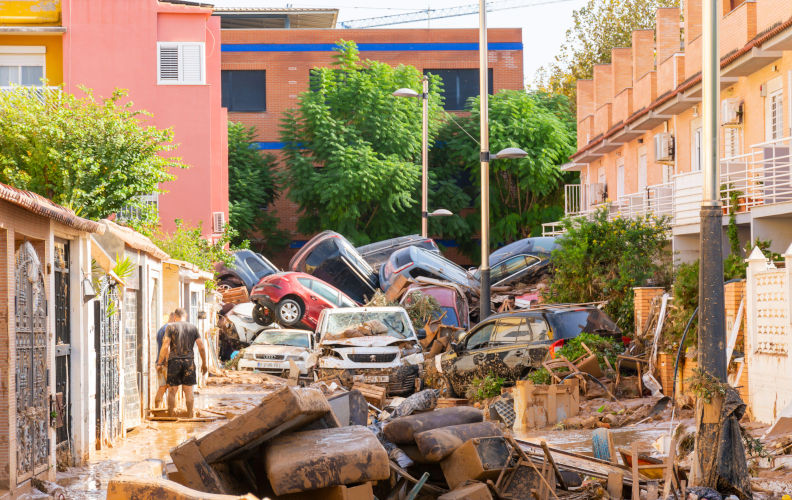Environmental breakdown: We have been warned
November 15, 2024
Sometimes a single event can throw global problems into sharp relief. The recent flood in Spain is one such phenomenon. If past experience is anything to go by, however, the implications of this catastrophic ‘weather event’ are likely to be studiously ignored by those in a position to do something about them.
Even by the standards of the increasingly frequent and cataclysmic environmental catastrophes that have become such a familiar part of quotidian reality, the inundation that transformed the region around Valencia was extreme and hard for those affected to comprehend. A year’s rainfall in 24 hours is outlandish even by our rapidly changing environmental experience, or it is at the moment, at least.
Understandably, the victims want answers and someone to hold accountable. If you’ve just lost all your possessions and narrowly escaped death, perhaps it’s not surprising that you might want someone to blame. ‘Nobody warned us’, became the frequent refrain in the aftermath of a biblical deluge.
But they did. For decades climate scientists have been warning anyone who would listen about the growing environmental crisis, its causes and likely consequences. While it may not be possible to pick out specific locations where environmental breakdown will manifest first or most fully, there is little doubt about our collective impact on the natural environment and the threat it poses to our future.
The paradox is that, despite the plausible predictions and the ever more visible reality, no one is taking the warnings seriously enough. Policymakers the world over continue to either downplay the potential dangers or pay lip service to the idea of responsible environmental behaviour at the regular international gatherings that are supposed to come up with collective solutions, but which are increasingly dominated by lobbyists from the fossil fuel industries.
Australia is one of the worst offenders in this regard. Not only do we have some of the most polluting industries in the world, but we have some of the highest per capita emissions, too. Just as well there aren’t too many of us enjoying what’s been described as a totally unsustainable ‘ imperial mode of living’.
No government in Australia has the courage or sense of international moral responsibility to do the sorts of things that are necessary to respond effectively to the endless warnings that radical change is needed if we’re to preserve our privileged way of life, much less help those at the coal face, to borrow an appropriate metaphor, of climate degradation. Indeed, shutting down the coal industry and stopping further fossil fuel expansion in places like Western Australia are essential if catastrophe is to be avoided.
Anyone who thinks this is alarmist hyperbole needs to read the CSIRO’s recently released State of the Climate report. Yes, it does make for gloomy reading. Crudely put, the north of Australia will be subjected to more catastrophic floods and storms, while the south will become an unbearably hot, drought-prone tinderbox. Oh yes, the seas are not only continuing to rise, but they’re much more acidic, too.
So, when your home gets washed away or consumed in the increasingly frequent and intense fires that are such a feature of our ever-hotter Summers, it’s no good complaining that you had no warning. True, individuals cannot stop fossil fuel projects, but we can put pressure on our politicians to do so. They are unlikely to act without concerted action and pressure from below. On the contrary, both the main parties are consumed with a fear of being wedged, and by the power of the fossil fuel lobby.
Even more insidiously, policymakers also have an eye on their post-political careers. In the face of some stiff competition, WA politicians are possibly the most shameless in this regard, with senior figures like Mark McGowan and former Treasurer Ben Wyatt moving straight to lucrative ‘advisory’ positions in the mining industry. State capture doesn’t get much more blatant in what is still patronisingly described as the ‘developing world’.
But perhaps we’re all just as bad. How else do we explain the rapid growth in sales of highly polluting, road-hogging SUVs? Difficult to think of a more telling indicator of the disjuncture between responsible personal actions and the need for a collective response to an environmental threat knows no borders. To be fair, no state can address such problems alone, but without pressure they won’t begin to cooperate in the way they must if catastrophe is to be avoided or at least minimised.
Encouragingly, the young seem to understand the danger they may face in their lifetimes, let alone any children they may be thinking of having. Little wonder a growing number aren’t bothering. Let’s hope they direct some of their spare time and energy to becoming politically active and making their elders rectify the damage they have consciously or unconsciously inflicted on the natural world. We really have been warned about what the future will look like if we don’t.

